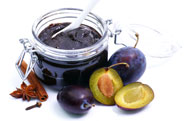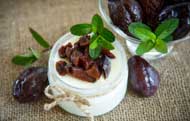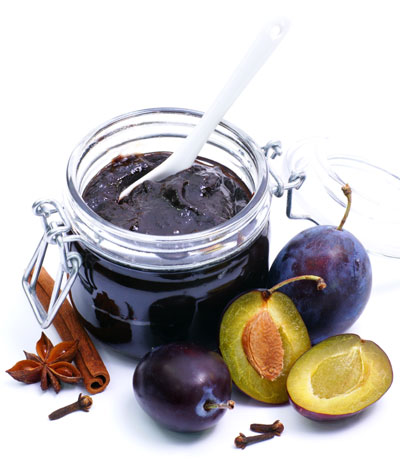





1. Plum Facts
2. Types of Plums
3. Nutritional Value of Plums
4. Health Benefits of Plum
Plum (Prunus domestica) is a species of flowering plant in the family Rosaceae. A deciduous tree, it includes many varieties of the fruit trees known as plums in English, though not all plums belong to this species. The greengages and damsons also belong to subspecies of P. domestica.
It typically forms a large shrub or a small tree. It may be somewhat thorny, with white blossom, borne in early spring. The oval or spherical fruit varies in size but can be up to 8 centimetres (3 inches) across. The pulp is usually sweet, but some varieties are sour. Like all Prunus fruits, it contains a single large seed, usually called a stone, which is discarded when eating.
History and Origin
Plums originated in several regions, including the Caucasus Mountains/Caspian Sea area for the European plum (P.domestica) and China for the Japanese plum (P.salicina). Historically, they have been cultivated since prehistoric times, with the European plum being spread by Roman and Spanish missionaries and settlers. Today, plums are a globally distributed crop, with China being the largest producer, and they are grown in all temperate climates.
- • Japanese Plums
- • Santa Rosa
- • Mariposa
- • Black Amber
- • D'Agen
- • European Plums
- • Dried Plums (Prunes)
- • Kakadu Plum
- • Davidson Plum (Ooray)
- • Illawarra Plum
- • Burdekin Plum
- • Nonda Plum
Commonly sold plum types in Australia include Japanese and European varieties like Santa Rosa, Mariposa, and Black Amber, along with blood plums and dried d'Agen prunes. Australian native plums such as the Kakadu plum, Davidson plum, and Burdekin plum are also grown, though they are less common in commercial markets.
Japanese and European Plums
Japanese Plums: These are well-suited for Australia's warmer climates and are known for juicy, colourful fruit. Common varieties include:
Santa Rosa: A popular, heat-tolerant choice with amber-red flesh.
Mariposa: A large, heart-shaped blood plum with deep red skin and sweet flesh.
Black Amber: A common variety with a dark skin and juicy flesh.
D'Agen: While a European variety, it's the main type used for prunes (dried plums) in Australia due to its high sugar content.
Other varieties: Including Fortune, Laroda, Friar, and Angeleno.
European Plums: These have a higher chill requirement and are suited to cooler climates. They are often smaller with a sweet yellow flesh and include varieties like the Green Gage.
Dried Plums (Prunes): Most prunes sold in Australia are made from the d'Agen plum due to its suitability for drying.
Native Australian Plums
Kakadu Plum: Known for its high vitamin C content.
Davidson Plum (Ooray): A less common but nutritious native plum.
Illawarra Plum: Another native species with a unique flavour profile.
Burdekin Plum: A native plum found in northern Australia.
Nonda Plum: A smaller native species.
Fruit ” Plum ” ( Nutritional value )
Nutritional value per 100 g
Plums, raw
|
Nutrient ( Proximate’s )
|
Unit
|
Value
|
Daily Value %
|
|
Energy
|
kcal
|
46
|
2.3%
|
|
Protein
|
g
|
0.70
|
1.4%
|
|
Total lipid (fat)
|
g
|
0.28
|
0.4%
|
|
Carbohydrate, by difference
|
g
|
11.42
|
4.1%
|
|
Fiber, total dietary
|
g
|
1.4
|
5%
|
|
Sugars, total
|
g
|
9.92
|
|
|
Minerals
|
|||
|
Calcium, Ca
|
mg
|
6
|
0.4%
|
|
Iron, Fe
|
mg
|
0.17
|
0.9%
|
|
Magnesium, Mg
|
mg
|
7
|
1.6%
|
|
Phosphorus, P
|
mg
|
16
|
1.2%
|
|
Potassium, K
|
mg
|
157
|
3.3%
|
|
Sodium, Na
|
mg
|
0
|
|
|
Zinc, Zn
|
mg
|
0.10
|
0.9%
|
|
Copper, Cu
|
mg
|
0.057
|
6.3%
|
|
Manganese, Mn
|
mg
|
0.052
|
2.2%
|
|
Selenium, Se
|
mcg
|
0.0
|
|
|
Fluoride, F
|
mcg
|
2.0
|
|
|
Vitamins
|
|||
|
Vitamin C, total ascorbic acid
|
mg
|
9.5
|
10.5%
|
|
Thiamin (B-1)
|
mg
|
0.028
|
2.3%
|
|
Riboflavin (B-2)
|
mg
|
0.026
|
2%
|
|
Niacin (B-3)
|
mg
|
0.417
|
2.6%
|
|
Pantothenic acid (B-5)
|
mg
|
0.135
|
2.7%
|
|
Vitamin B-6
|
mg
|
0.029
|
1.7%
|
|
Vitamin B-12
|
mg
|
0.00
|
|
|
Folate DFE (dietary folate) (B-9)
|
mcg
|
5
|
1.2%
|
|
Vitamin A, RAE (retinol)
|
mcg
|
17
|
1.8%
|
|
Vitamin E (alpha-tocopherol)
|
mg
|
0.26
|
1.7%
|
|
Vitamin D (D2 + D3)
|
mcg
|
0
|
|
|
Vitamin K (phylloquinone)
|
mcg
|
6.4
|
5.3%
|
|
Lipids
|
|||
|
Saturated Fatty Acids
|
g
|
0.017
|
0.08%
|
|
Monounsaturated Fatty Acids
|
g
|
0.134
|
|
|
Polyunsaturated Fatty Acids
|
g
|
0.044
|
|
|
Trans Fatty Acids
|
g
|
0.000
|
|
|
Carotenoids
|
|||
|
Beta-Carotene
|
mcg
|
190
|
|
|
Beta-Cryptoxanthin
|
mcg
|
35
|
|
|
Lutein + zeaxanthin
|
mcg
|
73
|
|

|
Reference Values are based on a 2,000 Calorie Intake, for Adults and Children 4 or More Years of Age. Your daily values may be higher or lower depending on your calorie needs.
|
|
Percentages are roughly approximated using (RDA) Recommended Dietary Allowances for adults. Source: Nutrient Database – USDA (United States Department of Agriculture)
|
|
Reference Values
|
Plum Nutritional Value
Plums provide health benefits due to their high content of antioxidants, fiber, vitamins, and minerals, which can support digestive health, boost the immune system, improve heart health, and protect against cell damage and chronic diseases. They contain antioxidants like anthocyanins and vitamin C, fiber that aids digestion, and essential minerals such as potassium and magnesium.
- RICH IN ANTIOXIDANTS
Plums are rich in antioxidants, particularly anthocyanins, which give them their dark colour. These compounds help protect cells from damage by fighting oxidative stress and may reduce inflammation, lower blood pressure, and lower the risk of chronic diseases like heart disease and diabetes. The Queen Garnet plum (Developed in Queensland and grown in all states around Australia) is a variety specifically noted for its high antioxidant content. - SUPPORT DIGESTIVE HEALTH
Plums support digestive health due to their high fiber and water content, which promote regularity and prevent constipation. They also contain sorbitol, a natural sugar alcohol with a mild laxative effect, and nutrients that support a healthy gut microbiome. - BENEFIT SKIN AND HAIR HEALTH
Plums benefit skin and hair by providing vitamins, antioxidants, and other nutrients that improve elasticity, reduce wrinkles, and strengthen hair follicles. They can be consumed as a fruit or applied topically through products containing plum extracts or oils. - SUPPORT BONE HEALTH
Plums, especially dried plums (prunes), can support bone health by preventing and even reversing bone loss, particularly in women after menopause. Studies show that regular consumption can increase bone mineral density, improve bone structure, and reduce markers of bone breakdown, likely due to their rich content of vitamins, minerals, and antioxidants.

- REDUCES INFLAMMATION
Plums reduce inflammation due to their high content of antioxidants and polyphenols, such as anthocyanins and phenolic acids. These compounds help fight oxidative stress, reduce inflammatory markers, and support overall health, including heart and brain function. - BLOOD SUGAR CONTROL
Plums can be beneficial for blood sugar control due to their fiber content, low glycaemic index (GI), and compounds like chlorogenic acid, which help slow glucose absorption and prevent sharp spikes. They also contain adiponectin, a hormone that regulates blood sugar, and are rich in antioxidants. For people with diabetes, moderation is key; consuming a limited amount, like one or two plums a day, is recommended. - SUPPORT HEART HEALTH
Plums support heart health due to their antioxidants (like anthocyanins), which reduce inflammation, and essential minerals such as potassium and calcium, which help regulate blood pressure and normal blood clotting. They also contain soluble fiber, which can help lower cholesterol levels. - BOOSTS IMMUNITY
Plums boost immunity primarily due to their high vitamin C and antioxidant content, which support the immune system and protect against cell damage. Vitamin C enhances the production of white blood cells, crucial for fighting off infections, while other antioxidants combat harmful free radicals that can weaken the immune response.
References
Nutrient Database – USDA (United States Department of Agriculture)
Reference Values for Nutrition – FDA U.S. Food and Drug Administration
Rich in antioxidants - Plums are rich in antioxidants, particularly anthocyanins, which give them their dark colour. These compounds help protect cells from damage by fighting oxidative stress and may reduce inflammation, lower blood pressure, and lower the risk of chronic diseases like heart disease and diabetes. The Queen Garnet plum (Developed in Queensland and grown in all states around Australia) is a variety specifically noted for its high antioxidant content.
Reduces inflammation - Plums reduce inflammation due to their high content of antioxidants and polyphenols, such as anthocyanins and phenolic acids. These compounds help fight oxidative stress, reduce inflammatory markers, and support overall health, including heart and brain function.
Support digestive health - Plums support digestive health due to their high fiber and water content, which promote regularity and prevent constipation. They also contain sorbitol, a natural sugar alcohol with a mild laxative effect, and nutrients that support a healthy gut microbiome.
Support Heart health - Plums support heart health due to their antioxidants (like anthocyanins), which reduce inflammation, and essential minerals such as potassium and calcium, which help regulate blood pressure and normal blood clotting. They also contain soluble fiber, which can help lower cholesterol levels, making them a beneficial addition to a heart-healthy diet.
Boosts immunity - Plums boost immunity primarily due to their high vitamin C and antioxidant content, which support the immune system and protect against cell damage. Vitamin C enhances the production of white blood cells, crucial for fighting off infections, while other antioxidants combat harmful free radicals that can weaken the immune response.
Blood sugar control - Plums can be beneficial for blood sugar control due to their fiber content, low glycaemic index (GI), and compounds like chlorogenic acid, which help slow glucose absorption and prevent sharp spikes. They also contain adiponectin, a hormone that regulates blood sugar, and are rich in antioxidants. For people with diabetes, moderation is key; consuming a limited amount, like one or two plums a day, is recommended.
Bone health - Plums, especially dried plums (prunes), can support bone health by preventing and even reversing bone loss, particularly in women after menopause. Studies show that regular consumption can increase bone mineral density, improve bone structure, and reduce markers of bone breakdown, likely due to their rich content of vitamins, minerals, and antioxidants.
Skin and hair health - Plums benefit skin and hair by providing vitamins, antioxidants, and other nutrients that improve elasticity, reduce wrinkles, and strengthen hair follicles. They can be consumed as a fruit or applied topically through products containing plum extracts or oils.
